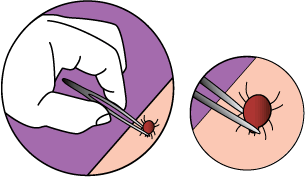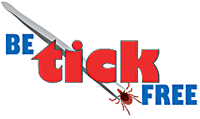How To Remove a Tick
Do a thorough body check for ticks after being outdoors
To remove a tick:
- Using tweezers, grasp tick near the mouth parts, as close
to skin as possible.
- Pull tick in a steady, upward motion away from skin.
- DO NOT use kerosene, matches, or petroleum jelly to remove
tick.
- Disinfect site with soap and water, rubbing alcohol or hydrogen
peroxide.
- Record date and location of tick bite. If rash or flu-like
symptoms appear contact your health care provider immediately.

Remove ticks as soon as possible to reduce your risk of getting
infected with Lyme disease or other tick-borne illnesses.
Questions? Call TCHD at 607-274-6604
Source: NYSDOH
Take precautions to help avoid ticks
 Certain
species of ticks — most notably the deer tick —
carry Lyme Disease. The best precaution one can take against
getting Lyme Disease is to limit exposure to ticks. Follow
these steps when hiking or working in areas where ticks are
most commonly found, such as woods and high grass:
Certain
species of ticks — most notably the deer tick —
carry Lyme Disease. The best precaution one can take against
getting Lyme Disease is to limit exposure to ticks. Follow
these steps when hiking or working in areas where ticks are
most commonly found, such as woods and high grass:
- Wear light colored clothing to spot ticks easier and brush
off.
- Tuck pants into socks and wear long sleeved tucked in
shirts to prevent ticks from reaching the skin. Wear closed
toed shoes.
- Consider using insect repellent. Apply according to directions
and use only the amount necessary. Keep out of reach of
children and do not allow children to apply repellents.
- Carefully check for ticks at the end of a day of outdoor
activity. Also check children and pets and remove ticks
promptly.
- Stay on cleared, well traveled trails.
- Keep lawns mowed and hedges trimmed. Clear brush and tall
grass around the house. Clear leaf litter and the remains
of perennials out of the garden in the fall.
- Keep the ground under bird feeders clean so as not to
attract small animals.
- Locate the children’s swing sets and other play
equipment in sunny, dry areas away from woods.
- Seek medical attention as soon as possible if symptoms
of Lyme Disease occur.
Get facts about Lyme Disease

